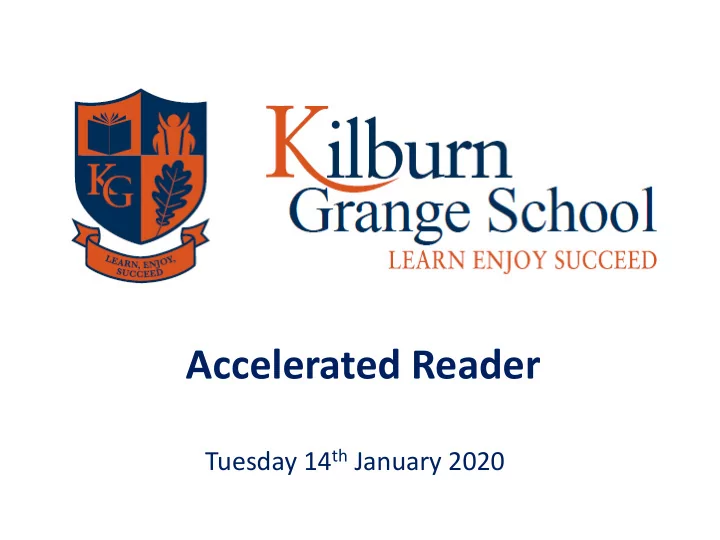

Accelerated Reader Tuesday 14 th January 2020
Book Levels • Books levels range from .5 - 13.5. Every book has a quiz and an interest level. Books can be one of the three interest levels: lower years (ages 5-8), middle years (ages 9-13) and upper years (ages 14+). The books your child can select from in their classroom will always be suited for their interest level.
Teachers Monitor Pupil Progress • Accelerated Reader provides instant feedback and tracks all scores. • Teachers monitor children’s progress through reading with the children, questioning, quiz results and STAR Reader tests. • Children should aim to get 85% or above on their comprehension quizzes. This indicates good comprehension and will lead to greater progress in reading ability. If children are failing their quizzes, this means they aren’t reading enough at home. If this is the case, the class teacher will let you know about this. • You can see if your child moved up, when they have a different colour book and children will let you know. It is normal for children to stay on the same level of book for 8-12 weeks.
Guided reading lessons in school – how do these work? • Guided reading is a timetabled lesson 4 days a week from Year 1 to Year 4. • In groups, children study a text selected by the teacher, which is within an appropriate ZPD range. • Children develop their reading fluency by reading the text aloud to a small group, with a partner, or with an adult. • The children then discuss and debate what they have read and answer comprehension questions to develop their understanding of what they are reading. • Example: Currently in Year 4 I have one group reading Pugs of the Frozen North and another group reading Race to the Frozen North – links to our current topic of Explorers and Adventurers.
Comprehension • Questions to ask before, during and after reading • Vocabulary words to point out and practise using in every day life context • Connect to story (visualise, experience, feelings, stories) • Ask a range of questions (who, what, when, which, why, how)
Example of Comprehension Exercise • Why do you think Goldilocks went inside the three bears house? What might she be thinking in the end of the story? • What did Goldilocks do when she entered the three bears’ house? • What colour is Goldilocks’ hair?
Help Your Child Become a Better Reader • • Practise! Children should be reading Be seen as a reader. • 15-20 minutes everyday. Read with Visit a library. your child every day. Make it part of your routine. Once your child is reading, take turns to read to and listen to your child read. • Ask your child questions about what they have read to check understanding and comprehension. • Provide a variety of experiences for your child. Many reading comprehension problems occur because a child lacks background information that would give meaning to words on a page.
Further Information • AR BookFinder is a website where you can search for books with Accelerated Reader quizzes and AR book levels. http://www.arbookfind.co.uk/ • Do you have any other questions?
Recommend
More recommend